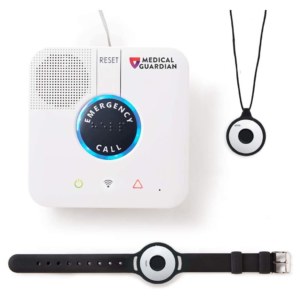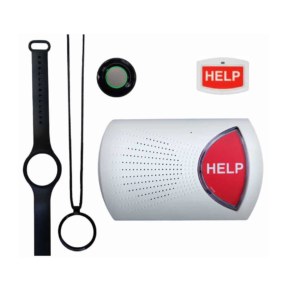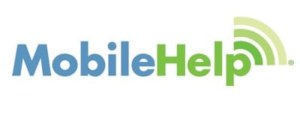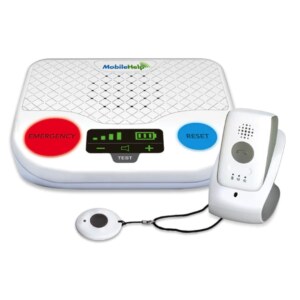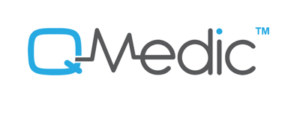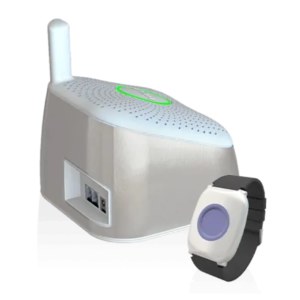Waterproof Medical Alert Systems
AgingInPlace.org keeps our resources free by working as an affiliate partner with some companies mentioned on our site. These partnerships or the commission we may earn do not affect our opinions or evaluations of the products we mention. Our reviews are solely based on our research methodology and from input from our AgingInPlace.org Advisory Board. Learn more about our ad policies.
Waterproof Medical Alert Systems
Products carousel
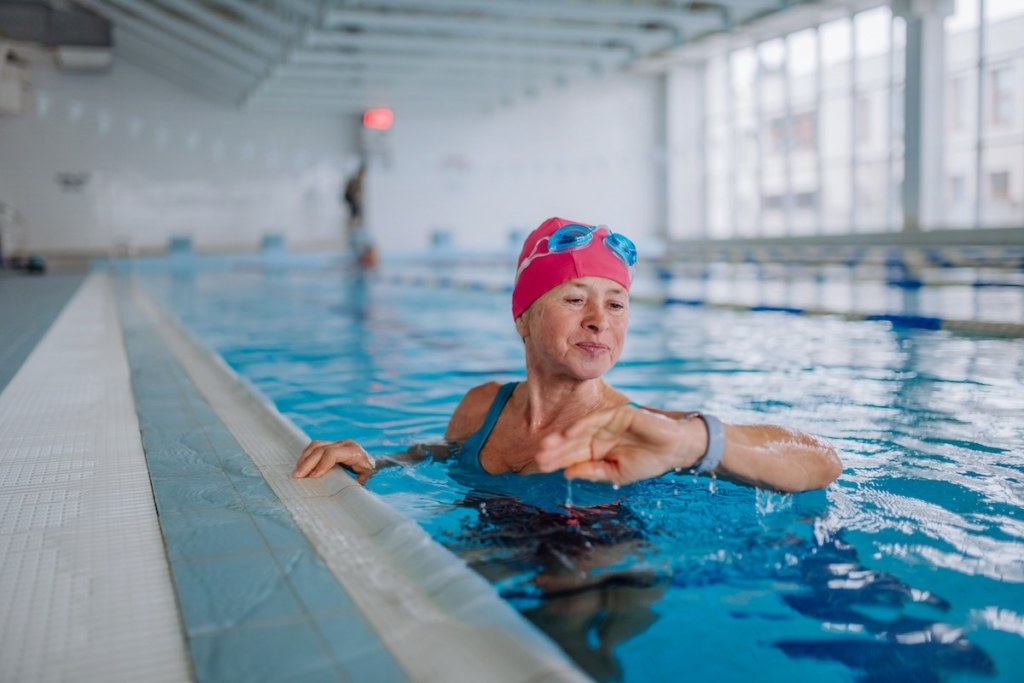
If you’re shopping for a medical alert system, have you considered a waterproof option? Waterproof medical alert devices can connect to an in-home or mobile system the same way a regular medical device does but offers the added benefit of being able to withstand water. Waterproof devices are an ideal option due to the fact that a large majority of accidents in the home happen in the bathtub or shower.
Key Takeaways
- Waterproof medical alert devices can still work, even if they’ve been exposed to water.
- Water-resistant medical alert devices can be worn in the shower but aren’t made to withstand being submerged in large amounts of water.
- Waterproof medical alert devices are especially great for individuals who like to take long baths, spend a lot of time outdoors, and who live near lakes and beaches.
- It would behoove you to consider a wall-mounted waterproof help button if you’d prefer not to wear medical alert jewelry in the shower.
Overview
Waterproof medical alert systems are devices that can still call for help even if submerged in water. Because most falls and accidents in the home happen in the bathroom, these devices are perfect for the extra reassurance they offer to those concerned with bathing safely. They are help buttons that can be worn as a necklace or wristwatch.
With one touch, a medical alert device will connect with your in-home or mobile medical alert system, automatically contacting emergency services. Waterproof medical alerts can do so even if you lose track of them in the tub or sink. There are also waterproof medical alert devices with automatic fall detection, so emergency services will still be contacted even if you or your loved ones cannot press the help button.
It should be noted that it’s best not to wear a waterproof medical alert device while taking extended baths or when in swimming pools, but they’re safe for showers and if you get caught in the rain.
Pros
-
Safe to wear in the shower
-
Typically lightweight and easy to wear
-
More durable than a regular medical alert system
Cons
-
We don’t recommend keeping your waterproof medical alert device submerged for too long, as being “waterproof” has its limits.
-
Not all waterproof medical alert devices have the same features.
Our Top Picks for the Best Waterproof Medical Alert System
- Best medical alert system overall: Medical Guardian
- Highest rated and most trusted: Bay Alarm Medical
- Best device range: MobileHelp
- Easiest to use: QMedic
Medical Guardian is one of the most popular medical alert system brands in the United States. Known for its affordable price and its TMA Five Diamond Certified Monitoring Center, Medical Guardian’s medical alert devices feature water-resistant help buttons. If you’re comfortable wearing medical alert jewelry in the shower, this is an excellent option. If not, Medical Guardian also offers wall-mounted emergency buttons that are perfect for use in the shower or anywhere else in the home.
Monthly base cost: $27.45-$36.62 + $10/month fall detection + $2.99/month wireless wall button
Device range: Home unit up to 1,300 feet
Connection type: Landline or cellular
Pros
-
Automatic fall detection
-
Wide range of coverage
-
Ability to customize how you wear the device with the optional belt loop clip
-
Home base station has a 32-hour backup battery
-
Cellular and landline plans available
-
No contracts
-
Free caregiver portal
-
24/7 US-based monitoring centers
-
TMA Five Diamond Certified for excellent monitoring center service
-
No activation or installation fee
-
Water-resistant; can be worn in the shower
Cons
-
Devices not fully waterproof
-
High upfront cost
-
$124.95 initial equipment fee on some devices
-
Fall detection costs extra and requires a separate pendant on the Mobile Guardian plan.
-
No money-back guarantee
See Our Full Medical Guardian Review.
Bay Alarm Medical is highly rated on Google Reviews, and for good reason. With an affordable monthly payment, 100% waterproof buttons, and various plans to suit your lifestyle, we highly recommend Bay Alarm Medical. If you’re nervous about committing to a plan, Bay Alarm Medical also offers a 30-day trial period or your money back. If you or your loved one’s spouse also needs protection in the bathroom, there is an option to add on a second waterproof medical alert pendant free of charge.
Monthly base cost: $19.95-$39.95 + $10/month fall detection
Device range: Home unit up to 1,000 feet
Connection type: Landline or cellular
Pros
-
Price-locked, which means your monthly rate will never increase
-
Fully waterproof buttons on any plan and can be worn in a bath
-
No installation or activation fees
-
Risk-free 30-day trial
-
No contracts
-
Wide coverage range
-
Money-saving bundle options for mobile and in-home plans
-
Free caregiver app
-
AT&T cellular location
-
Cellular and landline plans available
-
Automatic fall detection
-
24/7 US-based monitoring centers
-
Extra features on the Smartwatch plan, such as the step tracker
-
Customizable Bella charms option to make your help button stylish
Cons
-
Fall detection available at an extra cost
-
Smartwatch plan has a $159 initial device fee
-
Smartwatch plan does not have automatic fall detection unless bundled with an in-home plan
-
Smartwatch medical alert device only has a one-day battery charge
See Our Full Bay Alarm Medical Review.
MobileHelp is known for its impressive in-home coverage range and wide variety of plan options. The company also has many in-home/mobile plan bundles, which offer you peace of mind both in and out of the home for a fair price. Not all the plans include waterproof help buttons, so be sure to double-check when deciding which plan will best fit your lifestyle. MobileHelp’s in-home range is the largest on this list—up to 1,400 feet–which is perfect for most homes.
Monthly base cost: $19.95-$41.95 + $10/month fall detection
Device range: Home unit up to 1,400 feet
Connection type: Landline or cellular
Pros
-
No extra equipment costs
-
No activation costs
-
No long-term contracts
-
Free lockbox with every plan
-
Risk-free 30-day trial period
-
Some plans include waterproof help buttons (MobileHelp Duo, MobileHelp Solo, MobileHelp Classic).
-
GPS tracking on mobile plans
-
Can wear medical alert device as a necklace or wristwatch
-
Optional waterproof wall button for the shower
Cons
-
Caregiver app costs an additional $60/year
-
Water-resistant help button is separate from the regular in-home pendant
-
Water-resistant wall button costs an additional $2.95/month
-
Fall detection costs an extra $10/month
See Our Full MobileHelp Review.
QMedic has many features for both the wearer and the caregiver. The company´s cellular medical alert system is a fully waterproof wrist device with a simple design that can also keep track of sleep patterns and other unusual activities throughout the home. In essence, it can double as a medical alert device and home security tool. With the data they track over time, QMedic’s medical alert devices can build full reports and keep them on the caregiver app dashboard.
Monthly base cost: No monthly plan—yearly fee starts at $300/year; divided by month, comes out to $25 a month
Device range: 1,000 ft.; website lists range as “covering most 1-2 bedroom homes and yards”
Connection type: Cellular
Pros
-
Option of wrist or pendant device; both are waterproof
-
Easy to use—just one button
-
Battery life for wrist device lasts over two years and alerts user when low
-
Wellness reports are created and made available for caregivers on free caregiver app
-
In-home base unit has a two-way speaker system
-
Device self-tests and monitors all battery levels daily
-
No extra cost for fall detection
-
No cancellation fees
-
No installation fees
-
No contracts
-
Free ground shipping
-
No device fees
Cons
-
Website does not list exact device range
-
No landline options
-
Only yearly plans are available
-
Mobile option is not waterproof; it’s water-resistant
-
No risk-free 30-day trial
-
No lockbox options
See our full QMedic Medical Alert System review.
Waterproof Medical Alert Systems We Didn’t Pick:
Life Alert

Life Alert was not selected mainly because of pricing. Many affordable options are available when looking for a waterproof medical alert system, and Life Alert is always far above the average price tags, without any real justification for the uptick in cost. Furthermore, the website contains little information about its plans and features.
To get adequate plan information, you have to call the Life Alert helpline. Only then would you learn their plan prices exceed $49 a month with additional costs for wall buttons. The company also sells its plans through contracts, which you would have to commit to before receiving service.
Lively is a popular pick for waterproof medical alert systems, but it didn’t make our list due to upfront costs and poor performance reviews regarding its customer service. The device does come with extra features, like games and access to 24/7 nursing, but has upfront costs, such as a $49.95 fee for equipment and a $35 activation fee. Also worth noting, the 30-day money-back guarantee has a $10 restocking fee, which means that you don’t technically get all your money back if you choose this plan and decide against it later. Lively’s waterproof medical alert devices are also missing other features, such as two-way talking. Of further concern, the Better Business Bureau (BBB) lists many poor customer service reviews from users who needed emergency help.
Choose the Best Waterproof Medical Alert System for You

It is important to remember that everyone’s situation is different. What works well for one person might not work well for another. To find the best waterproof medical alert system for you, consider the following:
Where are you most often?
- Homebound
- Out and about
- Both at home and away
What kind of system are you looking for?
- Advanced models
- Easy to use
- Extra features like medication reminders and step-tracking
- Basic functions
What are your must-haves in a system?
- Affordable price
- Can be worn in public without drawing attention
- Caregiver app
- Quality customer service
- A variety of products and service packages to choose from
- Long in-home range
To be sure that you are getting the best fit, try out more than one system. Many (but not all) providers offer a risk-free trial.
Features to Consider When Shopping for a Waterproof Medical Alert System
- 24/7 emergency response: You never know when an accident can happen. 24/7 emergency response connects you to help right away, no matter what time it is.
- Equipment fees: Equipment fees are a pricy upfront cost. If you choose a plan with an equipment fee, you technically own the medical alert device. You will see fees like this often on plans with smart devices.
- Monthly rates: Monthly rates are determined without anything else like equipment fees or contract fees involved. Ask yourself: Is it too high? Or is it low, but without a lot of other features you want? Consider what you’re paying for when shopping for a waterproof medical system.
- Two-way talk: Two-way talk lets you speak directly with monitoring services and first responders. This setup makes getting help much easier than having to pick up a phone and call.
- Caregiver apps: Caregiver apps are all different, but they all exist with one main function: to allow your loved ones and their caregiver to message each other in real-time. Caregiver apps can also let caregivers check the wearers’ location if they aren’t home.
- Quick response time: Quick response time determines how fast the monitoring center answers your call and sends help your way. You’ll want a device with a decent response time, so you aren’t waiting for too long.
- Water resistance: Water-resistant medical alert devices are good for withstanding showers and light splashes of water, but not for floating or being submerged in large bodies of water. Waterproof medical alert devices are more durable than water-resistant devices because they can withstand more water.
- Extended battery life: Battery life can be the difference between your being able to call for help when the power is out, or not. Also, if you travel a lot and forget to charge your medical alert device, long battery life can also help keep your device working for longer.
- GPS location services: GPS location services are important, especially for plans with caregiver apps. It allows monitoring services and other approved members on your plan to view your exact location in real-time. If help is needed, they’ll know exactly where you are.
- Long-range: Long-range devices are important if you have a larger home. You won’t have to worry about accidentally wandering too far from the in-home base unit if you have a long-range device that allows you to call for help from wherever you are.
- Nationwide coverage: Nationwide coverage is a good feature for active seniors especially. No matter where you are in the United States, national coverage will make sure you can call for help if you need it.
- Fall detection: Sometimes when accidents happen, you can’t always press the help button. Fall detection is important because if your medical alert system has it, it will call for help automatically when it senses you’ve fallen rather than waiting for you to manually press the help button yourself.
- Easy set-up: Easy set-up is important if you want to avoid the hassle of professional installation. Easy set-up will save you the cost of extra fees and makes using your medical alert system simple.
Bottom Line
If you are considering a waterproof medical alert system, take stock of your lifestyle and what will work best for you. Do you prefer taking showers instead of baths? Try checking out water-resistant medical alert systems. There is an option for any budget, and if you don’t like the first option, many providers have a 30-day risk-free trial period. If you don’t want to wear medical alert jewelry in the bathroom, you should also consider a plan with a waterproof wall-mounted button.
Why You Can Trust Our Expert Review
AginginPlace.org has a devoted team of experts working behind the scenes to always ensure all of our information is up-to-date and accurate. We care about the health and lifestyle of all elderly citizens and make it our mission to give them and their caregivers the tools they need to prosper safely in the comfort of their own homes and independently outside of them.
Alongside our medical experts, we:
- Independently research and fact-check our information
- Review and consult with geriatric-focused medical professionals
- Survey medical alert system users and test their products
- Compare pricing and product features
- Review and interpret thousands of verified online reviews through online databases, such as the Better Business Bureau and Consumer Reports
FAQs
Frequently Asked Questions
-
You will need to contact your Medicare provider to see if your plan covers medical alert systems.
-
Waterproof medical alert devices can be in-home or mobile. “In-home” means a base unit is installed in your house with a maximum range of distance your device can be away from it and still be able to call for help.
-
Waterproof medical alert devices costs vary, depending on the plan and provider.
-
Check the website for the medical alert device you want to buy for purchase plans. If you’re unable to do so, contact your caretaker, family member, or doctor for help.
-
Many waterproof medical alerts are available on the market today, each fitting different needs. The best waterproof medical alert is the one that works for your unique needs and lifestyle.
*Pricing accurate as of April 13, 2022.
Other Medical Alert Guides And Medical Alert Systems That We Have Reviewed
- Best Medical Alert Systems
- Best Medical Alert Systems with Fall Detection
- Best Personal Emergency Response Systems (PERS)
- Best Medical Alert Systems With No Monthly Fee
- Best Medical Alert Watches for 2022
- Best Medical Alert Bracelets for Seniors
- Best Medical Alert Systems with GPS
- Medical Guardian Review
- Aloe Care Health Review
- MobileHelp Review
- Bay Alarm Medical Review
- Medical Alert Review
- GreatCall Review
- LifeStation Review
- LifeFone Review
- Philips Lifeline Review
- MobileHelp Smart Review
- Alert1 Review
- ADT Medical Alert Review
- Apple Watch Medical Alert Review
- GreatCall Lively Mobile Reviews
- Rescue Alert Medical Alert Review
- Life Alert Review
Learn More About Medical Alert Systems
- Does AARP Cover Medical Alert Systems?
- Is a Medical Alert System Tax-Deductible?
- Medical Alert Systems Covered by Medicare
- Who Should Wear a Medical Alert System?
- Pros and Cons of a Medical Alert System from Wal-Mart
- What Is The Cost of Medical Alert Systems
- Medical Alert Jewelry Option
WRITTEN BY
Kalise Gartner is a freelance writer focusing on products and businesses that serve those in need, as well as mental health and technology. She worked in the home healthcare industry alongside her mother in the early stages of her career, scheduling nurses and therapists for elderly patients. Her work has been used in small and local business pages, enriching and supporting her community’s business opportunities.
View AuthorDo you want to cite this page? Use our ready-made cite template.

